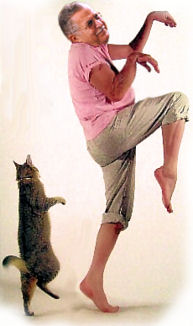 Quote: “We will not hand any Kurdish man to Turkey, even a Kurdish cat.” Iraqi President Jalal Talabani, a Kurd, quoted in the New York Times.
Quote: “We will not hand any Kurdish man to Turkey, even a Kurdish cat.” Iraqi President Jalal Talabani, a Kurd, quoted in the New York Times.
Figure of Speech: adynata (a-din-AH-ta), the last-people-on-earth figure. From the Greek, meaning “without power.”
Kurdish militants ambushed Turkish soldiers a few miles from the border with Iraq. Now Turkey is threatening to send its army across the border, and it’s demanding that Iraq capture the Kurdish militant leaders and extradite them to Istanbul.
Instead of a mere “No way, Dude,” President Talabani retorts with a fine adynata — a figure of thought that refuses a proposition by positing an absurdly desperate or favorable hypothetical example. A boy in high school might hear the adynata for the first time when he asks a girl for a date: “Even if you and I were the last people on earth,” she answers, “and the survival of the species depended on us, I still wouldn’t go out with you.” (For another example, involving a naked research assistant and a crate of whippets, click here.)
You can understand why girls used the adynata on young Figaro. But why is the Iraqi chief of state talking about Kurdish cats? Because he’s in a tight spot, politically. Iraqis are not keen on having yet another army invade them. On the other hand, Talabani’s entire political base consists of Kurds. He’s talking super tough while quietly encouraging some backroom diplomacy.
Rhetorical Lesson of the Day: When a politician spins hard one way, watch him run in the opposite direction.
Snappy Answer: “We’ll trade you five Turkish cats for one Kurdish militant.”